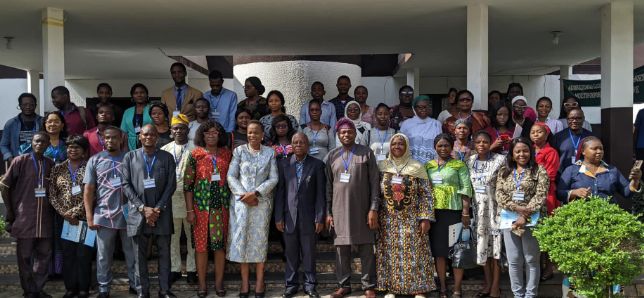Stakeholders have advocated safe motherhood and responsive fatherhood as key ingredients required for proper upbringing of children while calling for the eradication of child labour in the society.
The stakeholders at the Strengthening Capacity for Research and Policy Engagement in Shifting Notions of Motherhood and Fatherhood for Improved Children’s Well-being in Africa (SCaRPE-A) Conference include experts, academics, non-governmental organizations, scholars, educators, researchers, and students all came together to discuss parenting and children’s well-being in a changing world.
The conference organised in collaboration with the Department of History, University of Ibadan and Women’s Research and Documentation Centre (WORDOC), University of Ibadan, Nigeria held at the Otunba Subomi Balogun Conference Centre, UI.
Highpoint of the conference was the presentation of the policy report titled: “Parenting and Children Well-being in Nigeria: Dynamics, interventions and Agenda Action”.
The report was presented by the two conveners of the conference – Dr. Mutiat Oladejo, a senior lecturer at the Department of History, University of Ibadan and Dr. Sharon Omotoso who is a senior research fellow (Gender/Media Studies) at the Institute of African Studies, University of Ibadan.
In his opening remark, Dean of Faculty of Arts, University of Ibadan, Professor Solomon Oyetade, said organising the conference on parenting and children’s wellbeing in Nigeria was an important area of consideration in the world today, owing to the changing notions in parenting and child upbringing.
He noted that the upbringing of a child is the collective responsibility of society, but due to the high level of decadence in society nowadays, the upbringing of the child suffered a setback.
Oyetade also made reference to how modernity had affected the upbringing of a child and thereby making it worse.
The product of this, according to him, was what he described as (Abi i ko) one who was born, but not trained and (Ako i gba) one who received moral training, but refused to put the training into use.
Also, Head of Department of History, UI, Prof. Rasheed Olaniyi while joining the conversation called for the eradication of child labour in society.
He attributed some challenges facing children in society to bad parenting and that adequate steps needed to be taken to address those challenges.
Olaniyi, however, enjoined the political elite to address socio-economic problems confronting the nation as this would reduce the economic burden on parents, who engaged their children in hawking and other forms of street trading when they were supposed to be in school.
Speaking with reporters on the policy report, Dr. Oladejo highlighted some of the challenges facing motherhood in society which she said had placed the burden of child parenting strictly on mothers while neglecting the important role of fatherhood as an integral component in child upbringing.
She said “We have been on this project since 2021 and our advocacy is to improve children’s well-being and ensure proper child upbringing irrespective of whether you are father or mother.
“Notion of motherhood is usually entangled in the problem of women discrimination, biases against women in the society as there is too much burden on being a mother while fatherhood is relegated to only financial support to mother thereby neglecting the aspect of social, psychological and moral support to the mother.”
Oladejo, therefore, called for responsive fatherhood and safe motherhood to improve parenting and children’s well-being in Nigeria.
Some of the highlights that emerged from the conference included importance of education and tackling child labour, the impact of poverty and societal pressures on parenting, and the need for collaboration among stakeholders to improve children’s well-being.
The conference also highlighted the complex and evolving nature of childhood identity in Nigeria.
The urgent need for action to address issues such as child labor, out-of-school children, and illicit economies like baby factories and juvenile prostitution.
Some of the recommendations are increased enforcement against child trafficking, prioritizing education, and collaborative efforts from families, schools and NGOs amongst others.





